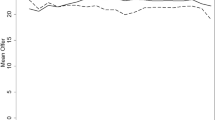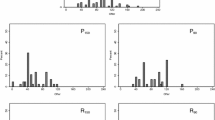Abstract
Ultimatum proposals and dictator donations are studied when proposers can choose the income and sex of the responder. Responder attributes generated strong effects in the selection decisions; subjects preferred to send proposals to low-income responders and female responders were much more popular than males. Hence, signals of income and sex appear to be important in deciding with whom to bargain. We also report from an experiment where both responders and proposers could select co-player based on socioeconomic status and gender. Both female responders and proposers were strongly preferred. A weaker tendency was that high status subjects were favored.
Similar content being viewed by others
References
Andreoni, J. and Vesterlund, L. (2001). “Which is the Fair Sex?.” Quarterly Journal of Economics. 116(1), 293–312.
Arrow, K. (1972). “Models of Job Discrimination.” Racial Discrimination in Economic Life. Lexington: Lexington Books, pp. 83–102.
Ball, S., Eckel, C., Grossman P., and Zame, W. (2001). “Status in Markets.” Quarterly Journal of Economics. 116(1), 161–188.
Becker, G.S. (1957). The Economics of Discrimination. Chicago: University of Chicago Press.
Bolton, G.E. and Ockenfels, A. (2000). “ERC: A Theory of Equity, Reciprocity, and Competition.” American Economic Review. 90(1), 166–193.
Croson, R. and Buchan, N. (1999). “Gender and Culture: International Experimental Evidence from Trust Games.” American Economic Review. 89(2), 386–391.
Cubbitt, R., Starmer, C., and Sugden, R. (1998). “On the Validity of the Random Lottery Incentive System.” Experimental Economics. 1(2), 115–131.
Dufwenberg, M. and Muren, A. (2000). “Discrimination by Gender and Political Correctness,” unpublished manuscript.
Eagly, A.H. (1995). “The Science and Politics of Comparing Women and Men.” American Psychologist. 50, 145–158.
Eckel, C. and Grossman, P. (1996). “Altruism in Anonymous Dictator Games.” Games and Economic Behavior. 16, 181–191.
Eckel, C. and Grossman, P. (2000). “Differences in the Economic Decisions of Men and Women: Experimental Evidence.” In C. Plott and V. Smith (eds.), Forthcoming, Handbook of Experimental Results.Elsevier, New York.
Fehr, E. and Schmidt, K. (1999). “A Theory of Fairness, Competition and Cooperation.” Quarterly Journal of Economics, 114(3), 817–868.
Fershtman, C. and Gneezy, U. (2001). “Trust and Discrimination in a Segmented Society: An Experimental Approach.” Quarterly Journal of Economics. 116(1), 351–77.
Fong, C. (2001). “Social Preferences, Self-Interest, and the Demand for Redistribution.” Journal of Public Economics 82, 225–246.
Fong, C. (2004). “Emphatic Responsiveness: Evidence from a Randomized Experiment on Giving to Welfare Recipients.” Unpublished Manuscript.
Forsythe, R., Horowitz, J., Savin, N.E., and Sefton, M. (1994). “Fairness in Simple Bargaining Experiments.” Games and Economic Behavior. 6(3), 347–369.
Gneezy, U. and Rustichini, A. (2000). “Pay Enough or Don’t Pay at All.” Quarterly Journal of Economics. 115(3), 791–810.
Güth W., Schmittberger, R., and Schwarze, B. (1982). “An Experimental Analysis of Ultimatum Bargaining.” Journal of Economic Behavior and Organization. 3, 367–388.
Hauk, E. and Nagel, R. (2001). “Choice of Partners in Multiple Two-Person Prisoner’s Dilemma Games.” Journal of Conflict Resolution. 45(6), 770–793.
Hoffman, E., McGabe, K., Stachat, K., and Smith, V. (1994). “Preferences, Property Rights, and Anonymity in Bargaining Games.” Games and Economic Behavior. 7, 346–380.
Hoffman, E., McGabe, K., and Smith, V. (1996). “Social Distance and Other-Regarding Behavior in Dictator Games.” American Economic Review. 86(3), 653–660.
Holm, H. (2000). “Gender Based Focal Points.” Games and Economic Behavior. 32, 292–314.
Holt, C. (1986). “Preference Reversals and the Independence Axiom.” American Economic Review. 76(3), 508-515.
Knez, M. and Camerer, C. (1995). “Outside Options and Social Comparison in Three-Player Ultimatum Game Experiments.” Games and Economic Behavior. 10, 65–94.
Konow, J. (2000a). “Fair Shares: Accountability and Cognitive Dissonance in Allocation Decisions.” American Economic Review. 90(4), 1072–1091.
Konow, J. (2000b). “Conditional versus Unconditional Altruism : Theory and Evidence.” working paper, Department of Economics, Loyola Marymount University.
Ortmann, A. and Tichy, L. (1999). “Gender Differences in the Laboratory: Evidence from Prisoner’s Dilemma Games.” Journal of Economic Behavior and Organization. 39(3), 327–339.
Phelps, E. (1972). “The Statistical Theory of Racism and Sexism.” American Economic Review. 62, 659– 661.
Prasnikar, V. and Roth, A. (1992). “Considerations of Fairness and Strategy: Experimental Data from Sequential Games.” Quarterly Journal of Economics. 107(3), 865–888.
Roth, A., and Malouf, W.K. (1979). “Game-Theoretic Models and the Role of Information in Bargaining.” Psychological Review. 86, 574–594.
Roth, A., Malouf, W.K., and Murnighan, K. (1981). “Sociological Versus Strategic Factors in Bargaining.” Journal of Economic Behavior and Organization. 2, 153–177.
Roth, A. and Murnighan, K. (1982). “The Role of Information in Bargaining: An Experimental Study.” Econometrica. 50(5), 1123–1142.
Roth, A. (1995). “Bargaining Experiments.” In Kagel J. and A. Roth (eds.), The Handbook of Experimental Economics. Princeton, NJ: Princeton University Press.
Selten, R. (1967). “Die Strategiemethode zur erforschung des eigeschrank rationalen verhaltens im rahmen eines oligopolexperiments.” In H. Sauermann (eds.), Beitrage zur experimentellen wirtschaftsforschung. J.C.B. Mohr: Tubingen, pp. 136–168.
Solnick, S.J. (1998). “Gender Difference in an Ultimatum Game.” Unpublished Working Paper, University of Miami.
Solnick, S.J. and Schweitzer, M.E. (1999). “The Influence of Physical Attractiveness and Gender on Ultimatum Game Decisions.” Organizational Behavior and Human Decision Processes. 79(3), 199–215.
Starmer, C. and Sugden, R. (1991). “Does the Random-Lottery Incentive System Elicit True Preferences? An Experimental Investigation.” American Economic Review. 81(4), 971–978.
Van Huyck, J. and Battalio, R. (2002). “Prudence, Justice, Benevolence, and Sex: Evidence from Similar Bargaining Games.” Journal of Economic Theory. 104(1), 227–246.
Author information
Authors and Affiliations
Corresponding author
Additional information
JEL Classification: C90, C78, J7, D63
Rights and permissions
About this article
Cite this article
Holm, H.k., Engseld, P. Choosing Bargaining Partners—An Experimental Study on the Impact of Information About Income, Status and Gender. Exp Econ 8, 183–216 (2005). https://doi.org/10.1007/s10683-005-1463-x
Received:
Revised:
Accepted:
Issue Date:
DOI: https://doi.org/10.1007/s10683-005-1463-x




